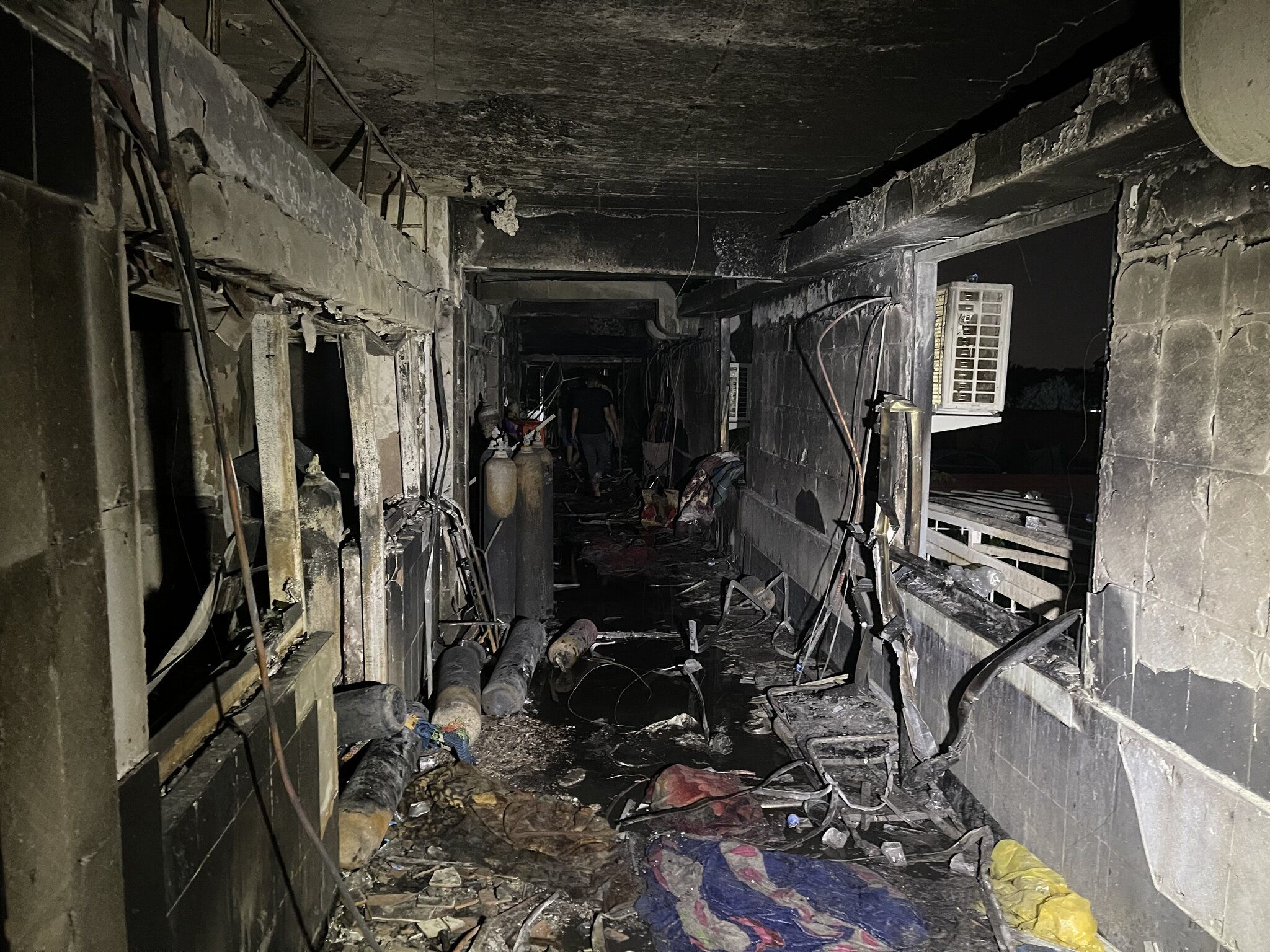
Fire at Baghdad Hospital Packed with Covid Patients
BAGHDAD — A fire sparked by an exploding oxygen cylinder killed at least 82 people, most of them Covid-19 patients and their relatives, at a Baghdad hospital late Saturday, a devastating example of the pandemic’s impact on a country riddled with corruption and a legacy of decrepit infrastructure.
The hospital, a facility dedicated to Covid-19 patients in one of Baghdad’s poorer neighborhoods, had no smoke detectors, sprinkler system or fire hoses, said Maj. Gen. Khadhim Bohan, the head of Iraq’s civil defense forces. The fire spread quickly because of flammable material used in false ceilings in the intensive care ward, he added.
“If there had been smoke detectors, the situation would have been totally different,” General Bohan told the state-run Iraqiya TV.
Doctors and rescuers described a chaotic scene at the hospital, crowded with relatives of patients despite what was supposed to be a ban on most visitors to avoid the spread of infection. Because of a lack of nursing staff, Iraqi hospitals, even in Covid wards, require a relative to help look after a patient.
The deadly fire struck as the world struggled with the biggest new weekly coronavirus case total yet, in a pandemic that has stretched well into its second year. Even as wealthier countries are rapidly rolling out vaccines, more countries than ever are struggling with overwhelming caseloads and mounting death tolls.
- Dig deeper into the moment.
Special offer: Subscribe for $1 a week.
Iraq is battling an intense new wave of coronavirus infections. On Sunday, the country reported 6,034 new coronavirus cases and 40 deaths, a figure that excludes those who died in the fire. Last week, the country of almost 40 million topped more than one million cases since the pandemic began last year.YOUR CORONAVIRUS TRACKER: We’ll send you the latest data for places you care about each day.Sign Up
Despite being one of the world’s biggest oil producers, Iraq is also suffering a financial crisis that economists attribute to decades of mismanagement and dysfunctional institutions. Its health care system was devastated by more than a decade of U.S.-led international sanctions against Saddam Hussein starting in the 1990s.
Since 2003, the government has spent billions of dollars to try to restore the health care infrastructure, but the system remains dysfunctional: Relatives must provide oxygen and medication in many hospitals.
Strained by huge patient counts, and heavy energy use amid a need for more oxygen supplies and ventilators, hospitals have been struck by an increasing number of fires like the one in Baghdad.

Kamala Harris cements her place in Biden’s inner circle during a consequential week
Vice President Kamala Harris was huddled with other White House officials in President Joe Biden’s private dining room last week when the room let out a “collective exhale.

” A Minnesota jury had found Derek Chauvin guilty of murdering George Floyd. As the large flat-screen television mounted on the north wall flashed three “guilty” counts, the room was overcome with a “sweeping sense of relief,” an aide said. Harris joined Biden and the first lady moments later in the Oval Office, where Floyd’s family was patched in by speakerphone. “She wants to say something,” Biden told the group, gathered in a hallway at the courthouse in Minneapolis, before ceding the line to his vice president.

“I’m just so thankful to the entire family. Your courage, your commitment, your strength has been a strength. This is a day for justice in America,” Harris told the group. “In George’s name and memory, we are going to make sure his legacy is intact and that history will look back at this moment and know that it is an inflection moment. “For Harris, it was also a moment that underscored her history-making presence within the young administration. She has often said she didn’t know a Black man growing up in Oakland that hadn’t faced a level of profiling and discrimination. Speaking to the Floyd family, Harris was presented an opportunity to tap into their collective grief in a way no vice president before her could.
Nearly 100 days into their tenure, Biden and Harris have worked to deepen their relationship, spending five hours or more together per day in meetings at the White House, according to aides.

Both Biden and Harris shunned work travel in the early days to set an example during the pandemic — forcing them into closer proximity than their predecessors.She began her tenure attending nearly every one of Biden’s events, provided her own speaking slot and always in-frame as the President delivered remarks, an unmissable — and intentional — level of visibility.


 Trump administration offers to pay plane tickets, give stipend to self-deporting immigrants
Trump administration offers to pay plane tickets, give stipend to self-deporting immigrants  The Force Awakens: Aiden Anderson’s Rise in Dallas Amateur Boxing
The Force Awakens: Aiden Anderson’s Rise in Dallas Amateur Boxing  Tesla’s Cybertruck Will Rapidly Depreciate From Now On
Tesla’s Cybertruck Will Rapidly Depreciate From Now On  Was it really about the Lil Wayne Concert
Was it really about the Lil Wayne Concert  Black Chicago Activists Blast Mayor Brandon Johnson for “Replacing” Them With Migrants
Black Chicago Activists Blast Mayor Brandon Johnson for “Replacing” Them With Migrants  Migrants desperately digging through trash bins for food as they live out of buses in Chicago
Migrants desperately digging through trash bins for food as they live out of buses in Chicago  Sofia Llamas: A Force for Good in Colorado – Igniting Hope and Empowering Communities
Sofia Llamas: A Force for Good in Colorado – Igniting Hope and Empowering Communities  Thomas Edward Patrick Brady Jr, Shedeur Sanders, Travis Hunter, Shilo Sanders, Jimmy Horn Jr, Global Don, and more
Thomas Edward Patrick Brady Jr, Shedeur Sanders, Travis Hunter, Shilo Sanders, Jimmy Horn Jr, Global Don, and more